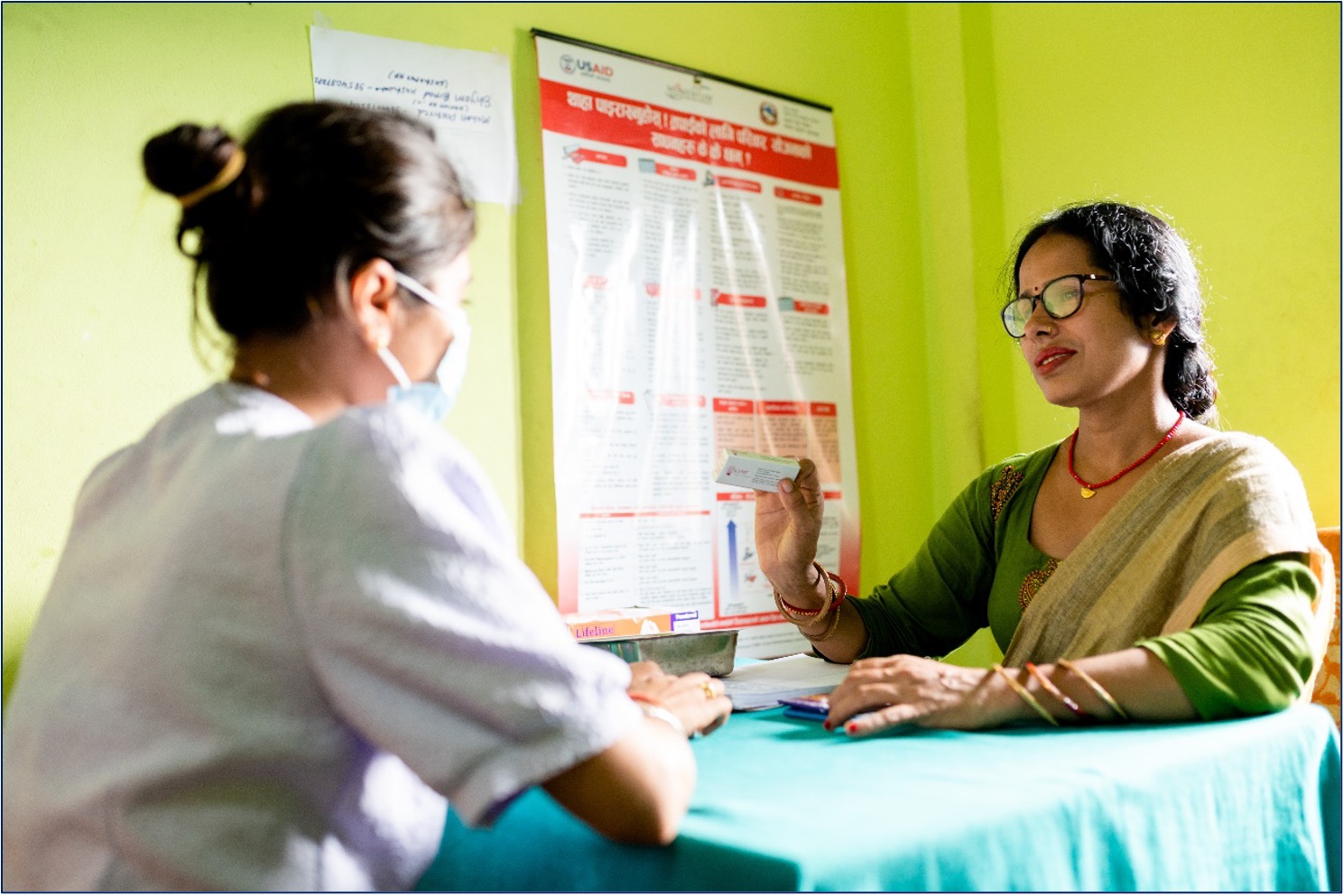Supporting High Quality Family Planning Services through Peer Communities in the Private Sector: An Experience from Nepal
Published on October 11, 2023

The piece below originally appeared on the Knowledge Success blog. Read the original piece here.
by Srishti Shah, Senior Communications, Documentation, and Knowledge Management Specialist for MOMENTUM Private Healthcare Delivery Nepal
Prioritizing and engaging the private sector is essential to meeting the contraceptive needs of all people globally. Based on an analysis of 36 low- and middle-income countries, 34% of women and girls obtain their modern contraceptive method from the private sector. In Nepal, 23% of women and girls between 15 to 49 years access family planning (FP) from the private sector. However, private sector providers in many countries are often fragmented and operate in isolation without much support. In this context, it is essential that private providers are trained to provide high quality FP services. It is equally important for governments to systematically engage the private sector in efforts to meet needs of women and girls, and opportunities to forge connections between private sector providers are created. The United States Agency for International Development (USAID)-supported MOMENTUM Private Healthcare Delivery project offers one example of how peer communities of private providers can improve engagement with each other to support an enabling environment for private sector provision of high-quality FP services.
Enhancing Private Sector Capacity to Provide High-quality FP Services with a Focus on Adolescents and Young People
Since May 2021, MOMENTUM Nepal has worked with 105 private sector service delivery points (73 pharmacies and 32 polyclinic/clinics/hospitals) in seven municipalities across two provinces (Karnali and Madhesh) to expand their access to high quality, person-centered FP services, especially for adolescents (15-19 years), and young adults (20-29 years). The project has done this through strengthening the technical and managerial capacity of private sector facility owners and providers. As part of technical capacity strengthening, the project collaborated with government health training centers to train private providers in Adolescent Sexual Reproductive Health (ASRH) and on how to administer injectable contraception as part of a range of FP methods. They conducted trainings focused on Values Clarification and Attitude Transformation so that adolescents and youth can obtain high-quality FP services while treated with respect and dignity by private providers. To sustain quality services from these partner sites, providers gained knowledge on how to enhance their skills in management, link improved quality and client experience with improved business, and support their ability to deliver high-quality services to meet demand.
Using Provider Cluster Meetings as Peer Communities to Catalyze Change
Aspart of this capacity strengthening effort, MOMENTUM Nepal organized monthly provider cluster meetings to help private providers review and improve the quality of FP services to young people, as part of a quality improvement approach. MOMENTUM established six clusters, each comprising of approximately 17 private sector providers and owners. To ensure capacity strengthening efforts (including training and coaching) translated into actual practice, the project conducted monthly quality assessments and drafted action plans.
The monthly provider cluster meetings served as a valuable platform to discuss and generate solutions to challenges that providers encounter in delivering high quality FP services. The discussions focused on the challenges providers and owners faced in meeting quality standards related to FP services including counseling and procedure, the availability of trained providers and counseling spaces, confidentiality and privacy, treating clients with dignity and respect, availability of information and communication materials, maintaining stock of FP commodities, and infection prevention including waste management. These discussions were also designed to highlight successful strategies used by high performing providers and owners who were effectively fulfilling gaps in the quality of FP services.
Over time, as trust continued to grow, the monthly provider cluster meetings evolved into supportive peer communities that helped catalyze changes extending beyond improvement of quality services. These changes included improvement in values and attitudes toward adolescent and unmarried youth, as well as in practices initiated by other interventions such as data-driven decision making and improving business skills. Providers were encouraged to share their journeys of attitude transformation and of the positive impact of the contraceptive services they offered to adolescents and youth. Considering that pharmacies formed more than 70% of the partner sites and given that most health practitioners established pharmacies with limited business or managerial knowledge, these meetings proved beneficial for sharing insights into the most valuable business skills gained from their trainings. Participants also exchanged innovative ideas for generating demand at health facilities, leveraging their enhanced technical knowledge to raise awareness about family planning methods through social media while offering service linkages. They also discussed utilizing social networking site chat features to provide tele-counseling and services, and bundling age-appropriate services into packages for adolescents and youth. The cluster meetings also served as a valuable platform for updating providers’ technical knowledge on ASRH and FP services.
“We knew some of the fellow private facility and pharmacy owners and providers from our municipality. But honestly, we only viewed them as competitors. Since our monthly provider cluster meetings among MOMENTUM-supported sites in our municipality, we realized that we could help each other out and work together to resolve common problems and also speak as one voice with the local government to highlight our work and pressure them to look into our problems,” shared Arjun Mainali, owner and provider of Sarlahi Jeevan Healthcare, a health facility in Barahathwa, Madhesh Province of Nepal, when asked what he thought of the monthly provider cluster meetings.
Furthermore, MOMENTUM organized quarterly review meetings involving municipal authorities and private providers, establishing a platform for public-private dialogues to address challenges, align expectations, and identify priority areas for collaboration. Health coordinators from each municipality were also invited to the monthly provider cluster meetings to supplement the quarterly review meetings and so that public-private discussions were continued. Discussions on waste segregation and management were continued in the monthly meetings and health coordinators provided additional clarity on government regulations. Regular engagement and requests from private providers in the monthly cluster meetings resulted in the inclusion of five MOMENTUM-supported providers from private facilities in the government’s Long-Acting Reversible Contraceptive (implants) training program, primarily designed for government health workers.
Sustaining Changes Through the Community of Peers
As MOMENTUM Nepal implemented its private sector FP approach, the program team recognized the value in peer communities that had evolved from the monthly provider cluster meetings. The project is continuing this provider cluster approach as it scales up to more than 800 additional private health facilities and pharmacies. Project-supported private providers and owners have emphasized how these communities could help sustain positive changes.
“To tell you the truth, I used to be very skeptical and afraid of government authorities. If they visited my health facility, the first thoughts would be that they are here to bother me. Since our quarterly and monthly meetings organized by MOMENTUM include local authorities, I have come to know them as people and I also understand what is priority for local government. I am clearer on what policies ask of me, so I am not afraid of government representatives anymore.”
– Mr. Purna Bahadur Bohora, Owner and provider of a health facility from Birendranagar, Karnali Province, Nepal
When asked about the changes and interventions that have been valuable to project-supported private providers and owners and how they would continue these efforts, the providers and owners highlighted the potential within peer communities that have evolved through the monthly provider cluster meetings to sustain the gains from the engagement with the project so far not only in quality improvement and business growth but also the opportunity to consolidate the private sector presence and voice priorities to the local government authorities. “We have developed strong camaraderie among our cluster members. We will be able to work together to continue this peer community and maintain dialogues with the municipal authorities which were initiated by the project,” shared Ramlila Bam, provider and owner of Ramlila Pharmacy in Karnali Province. Some clusters have discussed pooling resources to develop or purchase technological solutions that could help them continue data-driven decision-making such as tracking client visits, tracking quality improvement initiatives, implementing online client feedback surveys, and utilizing dashboards to understand client perspectives, and keeping stock of inventory by maintaining logs of sales. All these have been essential to the high-quality FP services they have been providing in partnership with MOMENTUM Nepal. The providers and owners see potential of the peer community to sustain and expand these initiatives. have been providing in partnership with MOMENTUM Nepal. The providers and owners see potential of the peer community to sustain and expand these initiatives.

Implications for Program Designers and Implementers
Be open to adaptations.
The provider cluster meetings focused on quality review evolved into a peer community approach and is now an important part of program scale up efforts. The approach and its structure will continue to evolve to respond to provider and owner needs and feedback as project implementation continues.
Focus on elements that can help give continuity to the peer community.
Some private providers and owners have suggested that the project facilitate the first few peer community events or meetings, and in later meetings allow private providers and owners to take turns facilitating these meetings. Equipping the providers and owners to identify common priorities and effectively engage members will allow them to utilize the peer community platform appropriately. Eventually, the goal is to enable the cluster members to lead these meetings on their own and refine the approach to suit their priorities to ensure sustainability of the peer community beyond the life of the project.
Recognize that not all communities of peers are collaborative.
While some communities of peers may be collaborative and enthusiastic in some clusters, others may show competitive dynamics. It is important to create win-win situations and to provide them with an environment of learning and skills building to support collaboration within the group. MOMENTUM Nepal organized games and quizzes during the cluster meetings to help enhance and update technical knowledge, fostering an environment of shared learning. In addition, inviting public authorities to participate in these cluster meetings helped them build better working relationships with public authorities and facilitated a unified voice for raising concerns, serving as incentives to work together.
Leverage chat groups using social networking sites to implement capacity strengthening and build relationships.
MOMENTUM Nepal established Facebook Messenger and Viber chat groups among municipality-wide clusters of project-supported sites to coordinate meetings. These chat groups can be useful when in-person meetings are not possible due to national or global pandemics such as COVID-19 or other emergencies. Going beyond coordination and logistics, these chat groups have also become platforms for knowledge sharing and mutual learning. Links to resources, such as the Family Planning Global Handbook for Providers are shared within these chat groups. Providers have also used these forums to share queries on managing common side effects of short acting contraceptive methods, with fellow providers offering peer support based on their own experiences.
“The biggest change for me has been that when clients come in for FP services, I have stopped looking for vermillion on foreheads, bead necklaces and bangles that usually married women wear. I understand now how important my role as a health provider is to provide unbiased and respectful Family Planning services so that we do not put them at risk of unwanted pregnancies.”
– Mrs. Seema Jha, co-owner and provider from Harion, Madhesh Province, Nepal

